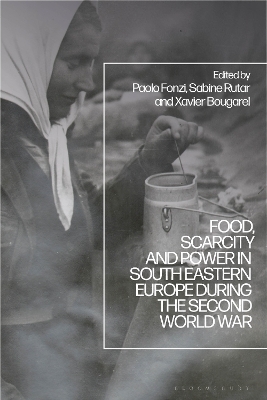
Food, Scarcity and Power in Southeastern Europe during the Second World War
Bloomsbury Academic (Verlag)
978-1-350-33391-8 (ISBN)
Controlling food was a key strategy adopted by all actors – be they occupiers, state institutions, resistance organizations, international humanitarian organizations or private interest groups – in substantiating their bid for power. As a predominantly agrarian area with a substantial peasant population, investigating this topic is particularly poignant for Southeastern Europe. From discussions of searching for and fighting for food to offering relief and instrumentalising of food politically, the chapters in this volume add nuance to discussions on the complex intertwined political and social dynamics of war and occupation. In so doing, this sophisticated study fills an important gap in our understanding of the Second World War, food policy, and the social history of Europe more broadly.
Paolo Fonzi is Assistant Professor in Contemporary History at University of Eastern Piedmont, Italy. Sabine Rutar is Senior Research Associate at the Leibniz Institute for East and Southeast European Studies, Germany. Xavier Bougarel is CNRS Researcher at CETOBAC, the Center for Turkish, Ottoman, Balkan and Central Asian Studies, France.
List of Figures
List of Maps
List of Contributors
List of Abbreviations
Food, Scarcity and Power: An Introduction, Paolo Fonzi,(University of Eastern Piedmont, Italy) Sabine Rutar, (Leibniz Institute for East and Southeast European Studies, Germany) Xavier Bougarel (CETOBAC, France)
Part 1 – Germany: Extracting Food and Labour
1. The Western Banat as Germany’s Breadbasket and the Role of the Banat Germans in Agricultural Extraction, Mirna Zakic, (Ohio University, USA)
2. Coal and Copper for the German War Effort: Food and Labour in Yugoslav Mining Industries, Sabine Rutar, (Leibniz Institute for East and Southeast European Studies, Germany)
Part 2 – Italy: Instrumentalizing Food
3. Between Chaos and Economic Weakness. Italian Food Policies in Albania (1939–1943), Alberto Basciani, (Roma Tre University, Italy)
4. Imperial Humanitarianism. Italy and the Greek Famine during the Second World War (1941–1943), Paolo Fonzi, (University of Eastern Piedmont, Italy)
Part 3 – Cities: Searching for Food
5. The Rationing System and Self-Sufficiency Efforts in Ljubljana during the Second World War, Mojca Šorn, (Institute of Contemporary History in Ljubljana, Slovenia)
6. Trying the Impossible: The Zagreb Jewish Community and the Provisioning of Female Camp Inmates (1941–1942), Marija Vulesica, (Humboldt University of Berlin, Germany)
Part 4 – Contested Territories: Fighting for Food
7. Food and Food Policies in Central Dalmatia from April 1941 to the Italian Capitulation in September 1943, Nikica Baric, (Croatian Institute of History in Zagreb, Croatia)
8. ‘To Live by the Gun’: Food Insecurity, Ethnic Violence and Political Mobilization in Occupied Greece (1941–1944), Spyros Tsoutsoumpis, (Lancaster University, UK)
Part 5 – Liberated Territories: Feeding the Partisans
9. Survival and Equity: The Moral Economy of the Liberated Territories of Western Bosnia (1941–1945), Xavier Bougarel, (CETOBAC, France)
10. The National Liberation Movement and Food Policies in the Liberated Inland Territories of Southern Albania (1942–1944), Markenc Lorenci, (Roma Tre University, Italy)
Conclusion: The Power of Food in Wartime, Paolo Fonzi, Sabine Rutar, Xavier Bougarel
Notes
Index
| Erscheinungsdatum | 01.10.2024 |
|---|---|
| Zusatzinfo | 10 bw illus |
| Verlagsort | London |
| Sprache | englisch |
| Maße | 156 x 234 mm |
| Themenwelt | Geschichte ► Allgemeine Geschichte ► 1918 bis 1945 |
| Geisteswissenschaften ► Geschichte ► Regional- / Ländergeschichte | |
| Geschichte ► Teilgebiete der Geschichte ► Militärgeschichte | |
| ISBN-10 | 1-350-33391-3 / 1350333913 |
| ISBN-13 | 978-1-350-33391-8 / 9781350333918 |
| Zustand | Neuware |
| Haben Sie eine Frage zum Produkt? |
aus dem Bereich


